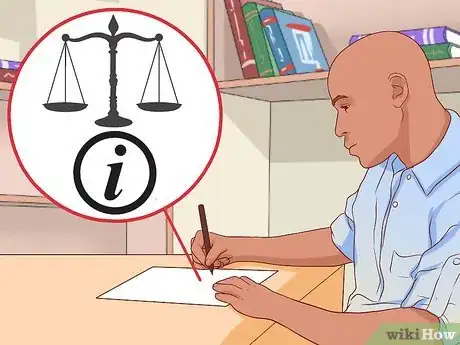This article was co-authored by Chris M. Matsko, MD. Dr. Chris M. Matsko is a retired physician based in Pittsburgh, Pennsylvania. With over 25 years of medical research experience, Dr. Matsko was awarded the Pittsburgh Cornell University Leadership Award for Excellence. He holds a BS in Nutritional Science from Cornell University and an MD from the Temple University School of Medicine in 2007. Dr. Matsko earned a Research Writing Certification from the American Medical Writers Association (AMWA) in 2016 and a Medical Writing & Editing Certification from the University of Chicago in 2017.
This article has been viewed 280,593 times.
Getting your medical records released to you sounds confusing, but the process is fairly straight forward. It can be somewhat lengthy, as gathering the needed forms and information takes time, but if you stay patient and follow protocol you can smoothly receive the records you need if you live in the U.S.. Some of this may be applicable elsewhere in the world.
Steps
Requesting Medical Records
-
1Know who can request medical records. Medical records often contain highly sensitive and private information. Only specific individuals have access to your medical records.
- States vary in procedures and policy in regards to handing out medical records, as do individual hospitals. However, federal law dictates that an individual has the right to access his or her medical records, make copies, and request amendments. For the most part, only you and your doctor have the right to access your medical records.
- In rare cases, you might need to obtain someone else's records. You will need a direct authorization signed by the patient. If the patient is incapacitated, legal documents will be needed to waive the signature. However, protocol for requesting someone else's records is a subject of debate and confusion in the medical community. If you need someone else's medical records for any reason, discuss the issue with an attorney to figure out the procedures necessary to obtaining that information.
- Married couples do not have the right to one another's medical records and signed authorization is needed to obtain a spouse's records. Parents usually have access to the medical records of children under 18 but there are some exceptions. If, for example, a child is over 12 some states allow records regarding reproductive health and sexual history to remain confidential.
-
2Gather the necessary material. To obtain your records, you need certain materials. Make sure you know you have all the necessary paperwork filled out before beginning the process of requesting records.
- Your healthcare provider's Health Information Management Department (HIM) can provide you with the authorization form specific to your hospital. This will need to be filled out in full.
- Information included in the authorization form varies from state to state and hospital to hospital. However, most forms ask for your address, date of birth, social security number, and phone number. You will also probably have to provide the dates you received treatment, what documents you want released, and your reasons for requesting the records.[1]
- Many hospitals, in order to speed up the process, allow the authorization form to be filled out online. Check if this is an option at your hospital if completing the forms online is more convenient for you.
- When you go in to request your records, you will need a photo ID.
Advertisement -
3Figure out what fees, if any, you need to pay. Fees vary from hospital to hospital, but there is specific protocol when it comes to charging for records. Be aware of this to avoid paying unlawful fees.
- Hospitals do have the right to charge fees for medical records. However, these fees are limited to the costs of the labor required to obtain the records. In other words, your hospital cannot use your records to make a profit.
- Usually, a hospital will charge a fee based on the number of pages in your records. There is a cap as to how much this fee is that varies from state to state. In New York, it's 75 cents a page and in California it's 25. Know what the maximum price per page is in your state and make sure you're not being overcharged. You can usually find this information on the Department of Health's website. To avoid these fees, ask your doctor to send the last SOAP Note from your final visit, or if you are in the hospital, request the discharge summaries that were dictated by your physician.
Obtaining Your Records
-
1Know what documents to request. On the authorization form, you will be asked to select what kind of records you want. If you're unfamiliar with medical terminology, this can be confusing. However, for patients, the following forms are most useful for tracking medical history and transferring doctors.
- Initial history and physical examination
- Any consultation reports conducted by specialists. Consultation reports review the patient's history, explain their medical needs, and lay out the reason another physician's advise is being requested.[2]
- Operative reports, which document the details of a surgery
- Test results
- Medication lists
- Discharge reports, which include the dates you were dismissed from a hospital and any at home care your provider recommended[3]
-
2Decide how you want to receive your records. You have a variety of options when it comes to receiving your medical records. Paper copies are what is generally requested, but you can request digital copies as well. If your hospital uses electronic records system, you can get your records in the form of a CD or USB drive. You can also have your information sent through email. Figure out what is most convenient for you and then make the request.[4]
-
3Be prepared to wait. Receiving your medical records takes time. It is not a same day process and you should be aware of waiting periods.
- Legally, your provider has to send you your records within 30 days of your initial request. They may be able to apply for a one time 30 day extension, but must explain the cause of this delay[5]
- Most facilities will not take 30 days and, on average, the waiting time is 5 to 10 days.[6]
- If you need your records because you are switching doctors or for insurance purposes, keep the waiting period in mind. Plan ahead and request your records well ahead of time.[7]
Knowing Your Rights
-
1Know your HIPAA Rights. HIPAA is the Health Information Portability and Accountability Act. You should be informed of your HIPAA rights when you start treatment with a new doctor, such as when you are admitted to a hospital or when you see a doctor for the first time. In general, HIPAA gives you the right to access your medical information and keep it private. This means that you have the right to:[8]
- ask for a copy of your medical records.
- request corrections to your medical records.
- be notified about how your information may be used or shared.
- decide how your information may be used.
- get a report on how your information was used.
- file a complaint if you think your information is not being handled properly.
-
2Know you are entitled to your medical records. You are entitled to your medical records. This is federal law and a hospital cannot withhold records for any reason, including delinquent payment. As stated, hospitals can charge for paper but they cannot charge a searching fee. If a facility tries to refuse to release your records, or demands a hefty sum of money for their release, talk to an attorney. Refusal to release medical records is rare, but does sometimes occur. Understand this is illegal.[9]
-
3Understand what information doctors can withhold. While you are legally entitled to most medical records, a doctor has the legal right to refuse to release certain documents regarding your medical history. These documents include:
- Personal notes
- Information regarding a minor over the age of 12, if the minor objects
- Any information the physician believes will cause substantial harm to you or others
- Information obtained from other physicians
- Substance abuse records or mental health records[10]
-
4Appeal a refusal, if necessary. In some cases, you might want or need certain information a doctor can legally refuse to release. If, for example, you're transferring to a specialist a doctor's personal notes and observations can provide your new physician important insight into your condition. There is an appeal process if your provider refuses to release certain records.
- Regulations vary from state to state. Most states require you file a written appeal, citing your reasons for needing the information, to the Department of Health. Your provider must then submit an explanation for his or her refusal.[11]
- A judge or committee decides whether or not the information should be released. If you win your appeal, your provider must legally release the documents. If you lose the appeal, the decision is final.[12]
Expert Q&A
Did you know you can get expert answers for this article?
Unlock expert answers by supporting wikiHow
-
QuestionHow do I go about getting a deceased love one's medical records?
 Daniel Wozniczka, MD, MPHDr. Wozniczka is an Internal Medicine Physician, who is focused on the intersection of medicine, economics, and policy. He has global healthcare experience in Sub Saharan Africa, Eastern Europe, and Southeast Asia. He serves currently as a Lieutenant Commander in the U.S. Public Health Service and a Medical Officer for the Epidemic Intelligence Service in the CDC. He completed his MD at Jagiellonian University in 2014, and also holds an MBA and Masters in Public Health from the University of Illinois at Chicago.
Daniel Wozniczka, MD, MPHDr. Wozniczka is an Internal Medicine Physician, who is focused on the intersection of medicine, economics, and policy. He has global healthcare experience in Sub Saharan Africa, Eastern Europe, and Southeast Asia. He serves currently as a Lieutenant Commander in the U.S. Public Health Service and a Medical Officer for the Epidemic Intelligence Service in the CDC. He completed his MD at Jagiellonian University in 2014, and also holds an MBA and Masters in Public Health from the University of Illinois at Chicago.
Internal Medicine Physician
-
QuestionMy doctor retired and closed his practice. How can I get my record?
 Chris M. Matsko, MDDr. Chris M. Matsko is a retired physician based in Pittsburgh, Pennsylvania. With over 25 years of medical research experience, Dr. Matsko was awarded the Pittsburgh Cornell University Leadership Award for Excellence. He holds a BS in Nutritional Science from Cornell University and an MD from the Temple University School of Medicine in 2007. Dr. Matsko earned a Research Writing Certification from the American Medical Writers Association (AMWA) in 2016 and a Medical Writing & Editing Certification from the University of Chicago in 2017.
Chris M. Matsko, MDDr. Chris M. Matsko is a retired physician based in Pittsburgh, Pennsylvania. With over 25 years of medical research experience, Dr. Matsko was awarded the Pittsburgh Cornell University Leadership Award for Excellence. He holds a BS in Nutritional Science from Cornell University and an MD from the Temple University School of Medicine in 2007. Dr. Matsko earned a Research Writing Certification from the American Medical Writers Association (AMWA) in 2016 and a Medical Writing & Editing Certification from the University of Chicago in 2017.
Family Medicine Physician
References
- ↑ https://www.aurorahealthcare.org/patients-visitors/medical-records
- ↑ http://www.dummies.com/how-to/content/medical-transcription-the-sections-of-a-consultati.html
- ↑ http://health.usnews.com/health-news/patient-advice/articles/2014/06/05/how-to-get-access-to-your-hospital-records
- ↑ http://health.usnews.com/health-news/patient-advice/articles/2014/06/05/how-to-get-access-to-your-hospital-records
- ↑ http://health.usnews.com/health-news/patient-advice/articles/2014/06/05/how-to-get-access-to-your-hospital-records
- ↑ http://health.usnews.com/health-news/patient-advice/articles/2014/06/05/how-to-get-access-to-your-hospital-records
- ↑ http://health.usnews.com/health-news/patient-advice/articles/2014/06/05/how-to-get-access-to-your-hospital-records
- ↑ http://www.hhs.gov/hipaa/for-individuals/guidance-materials-for-consumers/index.html
- ↑ https://www.health.ny.gov/publications/1443/
About This Article
Getting a copy of your medical records is a relatively straightforward process. You’ll need to contact your healthcare provider’s Health Information Management Department and ask for an authorization form for your medical records. On the form, choose which information you want to receive, such as your history of physical examinations, specialist consultations, test results, medication lists, and operation reports. You may need to pay a small fee, but this shouldn’t be more than a few dollars. You can request a physical or digital copy of your records. You should receive them within 30 days by law. For more tips from our Legal co-author, including how to appeal a refusal to provide your medical records, read on.




































































Medical Disclaimer
The content of this article is not intended to be a substitute for professional medical advice, examination, diagnosis, or treatment. You should always contact your doctor or other qualified healthcare professional before starting, changing, or stopping any kind of health treatment.
Read More...